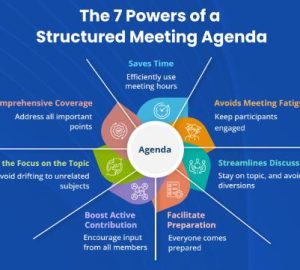What Should Be Included in a Weekly Management Meeting Agenda?
Effective management is the backbone of any successful business, and weekly management meetings play a pivotal role in maintaining this effectiveness. These meetings are crucial for keeping senior leaders aligned, making strategic decisions, and tracking the progress of company objectives. Here’s a comprehensive look at the essential items that should be featured on a weekly management meeting agenda to ensure productivity and strategic alignment.

Review of Key Performance Indicators (KPIs)
Starting the meeting with a review of critical performance indicators ensures that all decisions are data-driven. This might include sales revenue, customer acquisition costs, or operational efficiency metrics. Typically, successful companies discuss KPIs that show performance trends over time, such as monthly or quarterly growth rates.
Project Updates and Milestones
Each week, updates on major projects should be discussed to track progress against timelines and budgets. This includes highlighting any completed milestones, phases that are behind schedule, and any unforeseen challenges that might impact project delivery. For example, if a new product launch is scheduled, the current status of the marketing, production, and distribution plans would be critical discussion points.
Resource Allocation and Budget Review
Effective resource management is key to operational success. Management meetings should always include a segment on resource allocation, where discussions about budget distributions, potential reallocations, and financial forecasts take place. These discussions often involve reviewing spending against budget for various departments and projects.
Strategic Decisions and Policy Changes
An essential part of the weekly management agenda is dedicated to strategic decision-making. This might involve entering new markets, adjusting marketing strategies, or implementing new company policies. Decisions made during these meetings are typically based on data presented earlier in the session, ensuring that every strategic move is backed by solid evidence.
Risk Management and Mitigation Plans
Addressing potential risks and their mitigation is crucial for sustained business health. Management teams should discuss new risks identified during the week, review the status of existing risks, and update or modify mitigation strategies as necessary. This proactive approach helps in managing potential negative impacts on the business.
Leadership and Development Initiatives
Discussing ongoing leadership development and future planning for team growth is also vital. This can include leadership training programs, succession planning, and employee development initiatives. By investing time in discussing these areas, companies ensure continuity and capacity-building within their leadership ranks.
Weekly Management Meeting Agenda
Every item on a weekly management meeting agenda should aim to provide actionable insights, foster strategic thinking, and ensure that all members of the management team are aligned with the company’s direction and goals. The agenda should be tightly managed to respect time constraints while allowing ample discussion for strategic decisions and critical updates.
The Takeaway
In conclusion, the effectiveness of a weekly management meeting hinges on a well-structured agenda that covers all critical aspects of the business. By systematically addressing KPIs, project updates, resource allocation, strategic decisions, risk management, and leadership development, management teams can make informed decisions that propel the company forward. A robust agenda is not just a list of discussion points; it’s a strategic tool that guides leadership teams in maintaining the momentum towards achieving business objectives.